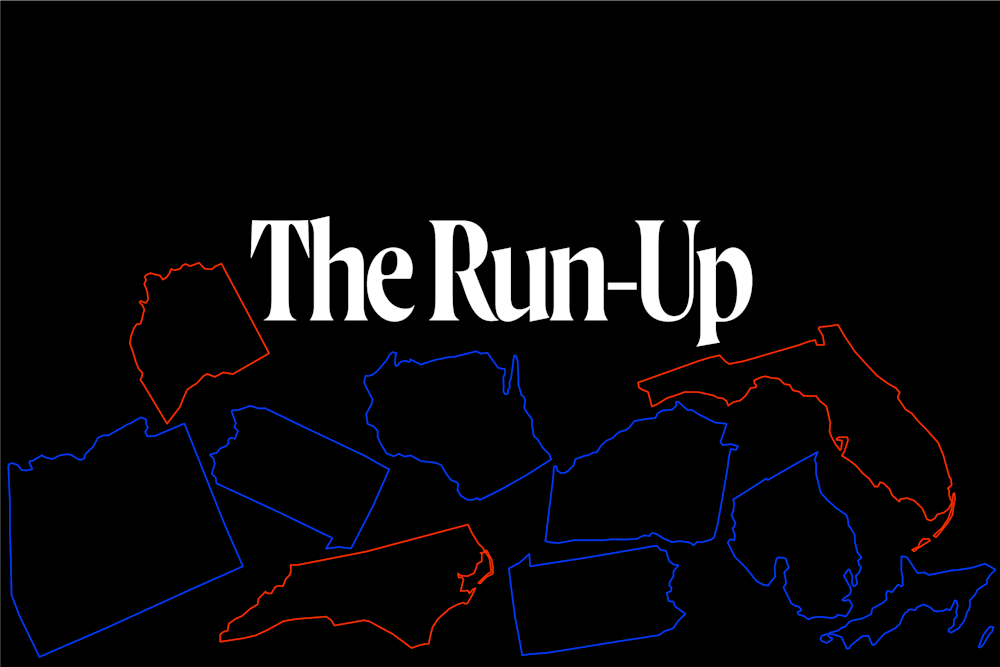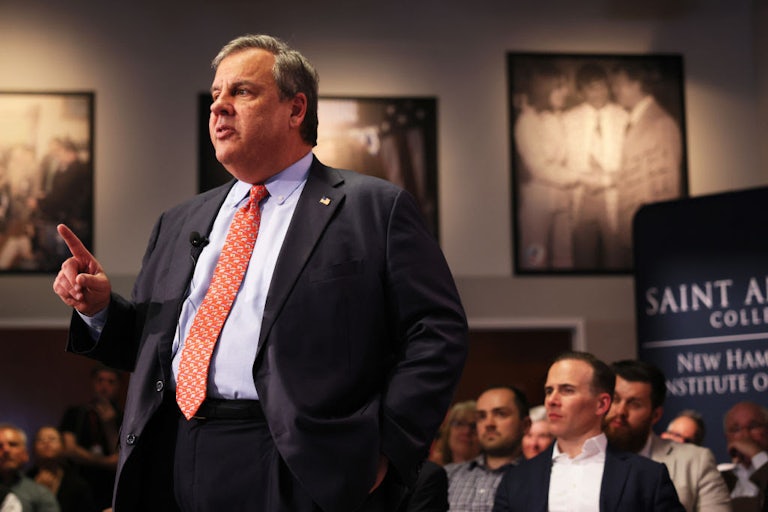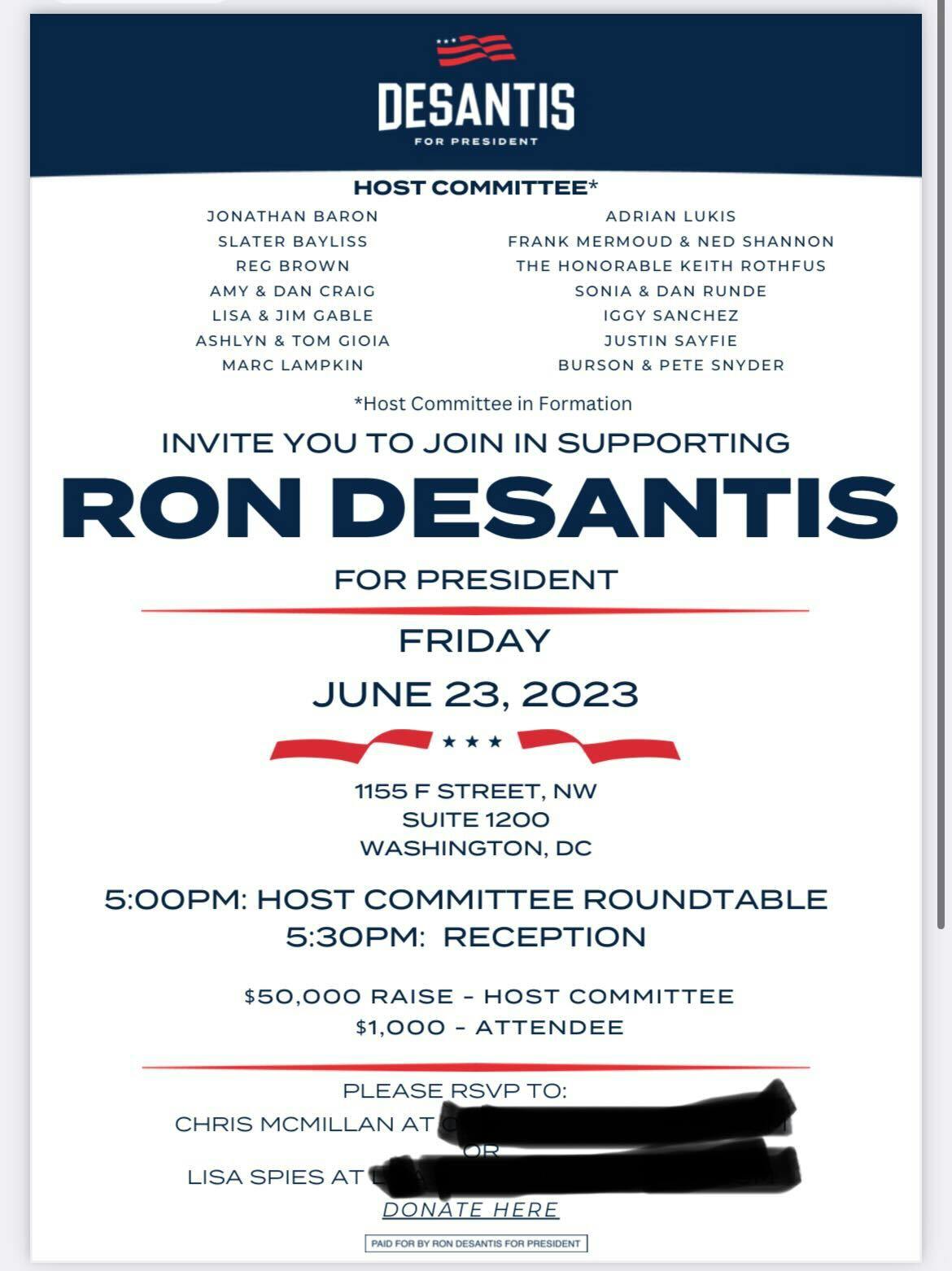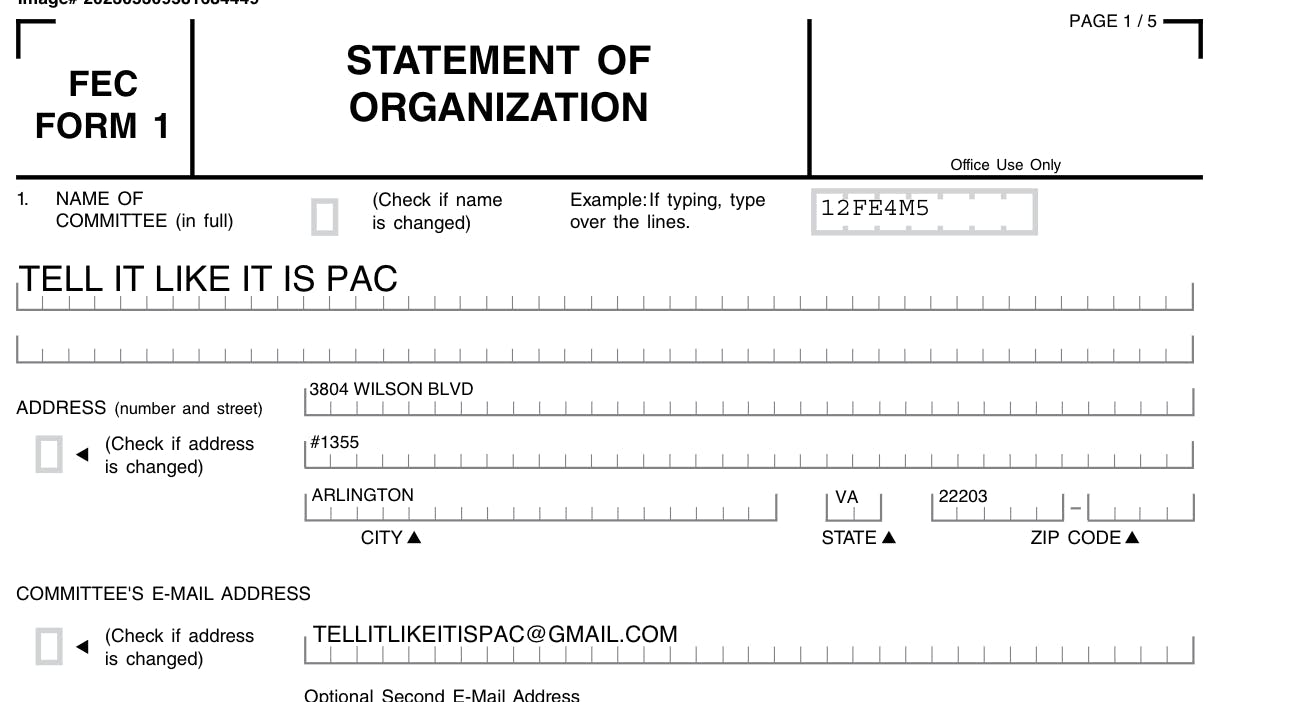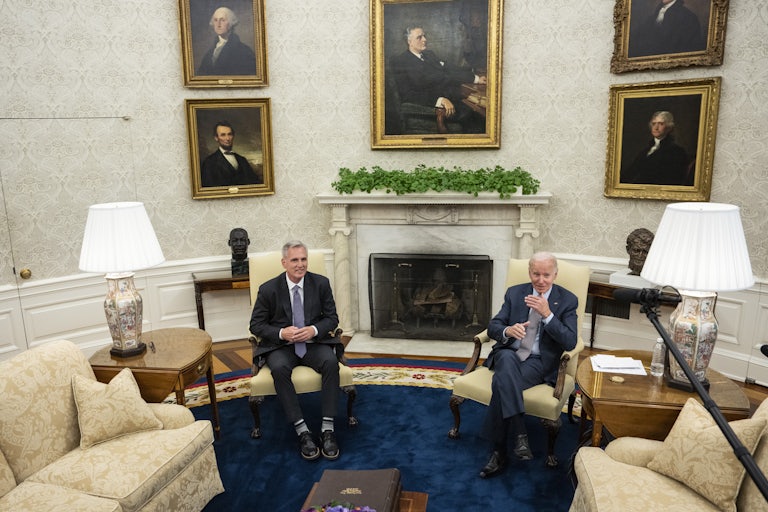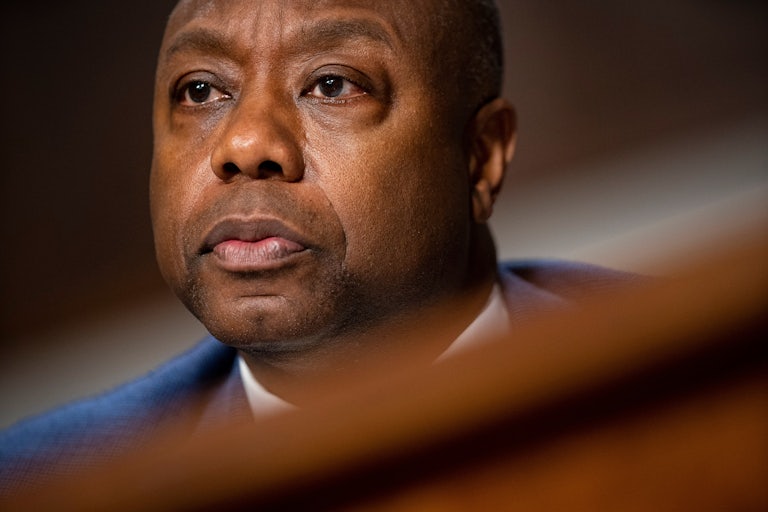What If Trump’s Indictment Doesn’t Change a Thing?
PLUS: Congress tackles A.I., and GOP senators stay neutral.
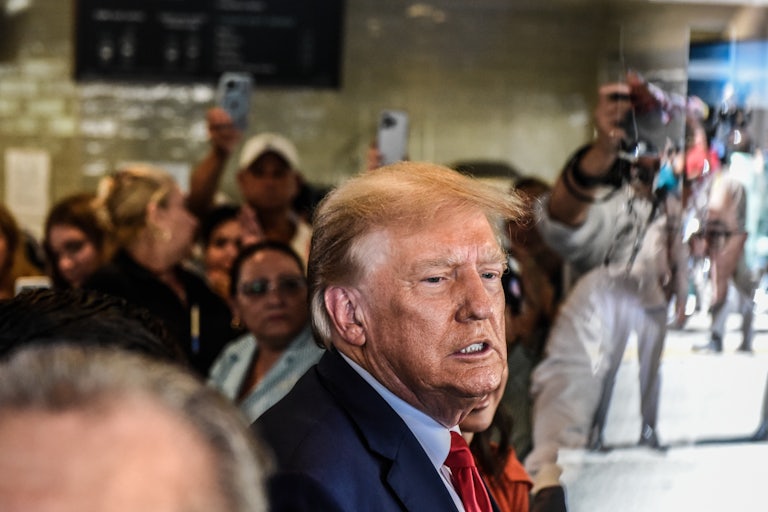
The top
Artificial intelligence arrived in the Capitol this week as lawmakers got the first of three closed briefings on the suddenly everywhere technology. The briefing was about where A.I. is today and was conducted by MIT professor Antonio Torralba, an expert in the field. Senate Majority Leader Chuck Schumer, speaking on the Senate floor, described it as a senators-only hearing about A.I.’s “capabilities, its applications, its limitations, and its challenges.”
Tuesday’s session was part of the scramble both Democrats and Republicans are undergoing to try to figure out how to respond to A.I. technology in politics. Caucuses are forming. Lawmakers are holding subcommittee hearings. Republicans hope that the technology can help improve border security. Former Google CEO Eric Schmidt has testified on how the technology will impact “our society, economy, and ultimately national security.”
The hullabaloo is as frantic in the campaign sphere. There have been predictions that A.I. will produce a waterfall of deep-fake video and audio clips (there are already a few disturbing examples thanks to Florida Governor Ron DeSantis’s campaign, as well as phony clips of Nancy Pelosi and former Chicago mayoral candidate Paul Vallas).
The optimistic flip side is that A.I. will make it easier for underdog candidates to compete, especially by helping streamline some lower-tier campaign jobs—what Democratic strategist Colin Strother characterizes as “brute” work, such as rapid response or microtargeting. “If you can automate all of that, then these previously time-intensive, labor-intensive and therefore cash-intensive campaign functions get a lot easier to do and a lot cheaper to accomplish,” Strother told Roll Call.
So that’s the positive. The negative, again, is that A.I. will put the practice of spreading misinformation into overdrive. But let’s take a breath here. It’s not like misinformation in campaigns is anything new or new in just the past few years. The fear, though, is that with A.I.’s good will come a lot of bad as well.
“It’s going to be an accelerant and a scaler of things that are both nefarious and positive, things that people have already been able to do,” said Teddy Goff, a Democratic strategist who was the new-media guru for Barack Obama’s first presidential campaign. “There’s been the ability to mislead voters dating back to people putting flyers on trees that claim something or other. Then obviously push polls are a whole other thing. So misleading voters as to what candidates have said and done is not a new tactic, but this could allow people to do it faster and more convincingly, at greater scale.”
Goff added, in terms of targeted disinformation: “It’s sort of an extension of the trends that we’ve seen in every election in memory, where those who want to muck around [in] our elections have more tools at their disposal to do it faster and smarter and at greater scale.”
Goff, though, cautioned that the worst-case scenario isn’t a news cycle in which a campaign is caught perpetuating a very convincing A.I. deep fake.
“That’s actually probably the preferable scenario,” Goff said. “Even that preferable scenario is bad. As we all know, more people are probably reached by the lie than are reached by the fact check, that’s one. Two, I think, even when something is successfully debunked or fact-checked, the whole incident has worsened the dynamic where nobody knows what to trust and everyone thinks everything else is lying; everyone thinks information ought to be taken with a grain of salt. I think that’s, basically, bad for democracy, bad for Democrats, and I think bad for people’s mental health and bad for society.”
The worst-case scenario is different, Goff continued.
“What’s also likely to happen is millions of deep fakes all the time making it onto people’s feeds, sometimes individually targeted or targeted toward tiny little subcommunities,” Goff said. “Not exactly going viral but reaching 100 or 10,000 people at a time, well below the pay grade of any professional fact-checking operation, and I think the aggregate impact of that at scale could be impossible to track and hugely deleterious to democracy and also [to] the only one of our two parties that believes in protecting our democracy.”
Indictment indifference
For the sake of argument, let’s agree that getting indicted and arrested for hoarding classified documents in a resort bathroom is, generally speaking, not great for a presidential candidate. But Donald Trump isn’t any candidate—he’s a former president who has bounced back from scandals that would wipe out any other politician’s career a thousand times over.
There’s conflicting conventional wisdom as to how the latest indictment news will affect Trump’s candidacy. One theory, that it will only strengthen him as a candidate, points to polling showing that his previous indictment, by the Manhattan district attorney, bolstered his support among Republican voters. Others believe that it may help him in the short term but could further alienate voters in a general election.
But there’s a third possibility: What if this doesn’t change anything? What if Trump still becomes the Republican nominee, facing off against Joe Biden, and the country gets to experience 2020 Part II: Electric Boogaloo? According to a recent ABC News/Ipsos poll, a plurality of Americans believe the federal grand jury was correct to indict Trump, with predictable splits along party lines. Yes, he is the first-ever former president to be federally indicted—but voters’ beliefs about him are likely baked in, regardless of what he has allegedly done.
A Quinnipiac University poll released on Wednesday found that support for Trump among Republican and Republican-leaning voters remains unchanged in the wake of the indictment, with 53 percent saying they would support him in the primary. The poll also found that in a head-to-head matchup, Biden would narrowly lead Trump by 48 percent to 44 percent.
“I don’t think this changes Donald Trump’s profile,” Senator Josh Hawley said. “I think people who hated him will be like, ‘See, I knew I hated him.’”
Trivia, tips, and pet pics
We want to hear from you! Do you think Trump’s indictment and arrest will change anyone’s mind? Are you also tired of constantly dealing with presidential campaign news when we’re still a year and a half away from the general election?
Or do you want to enter our weekly dog and cat photo contest (winner at the bottom)? Email us: dstrauss@tnr.com and gsegers@tnr.com.
Senate Republicans stay neutral
While many House Republicans have flocked to endorse presidential candidates, GOP senators have been more circumspect, often declining to wade into the primary. Trump has garnered support from 10 conservative senators, while North Dakota Governor Doug Burgum’s two home-state senators have endorsed him, and Senator Tim Scott has the support of South Dakota’s two senators. But no other candidate has earned a senatorial endorsement, and many Republicans in the upper chamber seem happy to stay out of the game.
Senator Marco Rubio said that he had spoken to “most of” the candidates— including the governor of his state, Ron DeSantis—but did not plan to endorse in the near future. “I don’t think my endorsement is going to decide [anything],” Rubio said. “Frankly, I don’t think endorsements from senators right now are going to change the outcome.”
That sentiment was echoed by Senator Cynthia Lummis, who said she hadn’t heard from any of the campaigns about an endorsement but her “inclination is to not endorse in the primary.” Senator John Cornyn did not respond directly when asked if any campaign had reached out and asked for his endorsement, only saying: “Well, I like Tim Scott an awful lot, but I’m not going to get involved in the primary.”
Hawley, however, indicated that he believed an endorsement in the primary would be a moot point. “I think Donald Trump is going to be the nominee. I just think it’s inevitable,” he said. “No offense to anybody else.”
Document of the week
This week’s document is a fundraising invitation for Virginia House Minority Leader Don Scott, a Democrat. The fundraiser on Tuesday was headlined by special guests former Governor Terry McAuliffe and Congressman Bobby Scott, both Democrats.
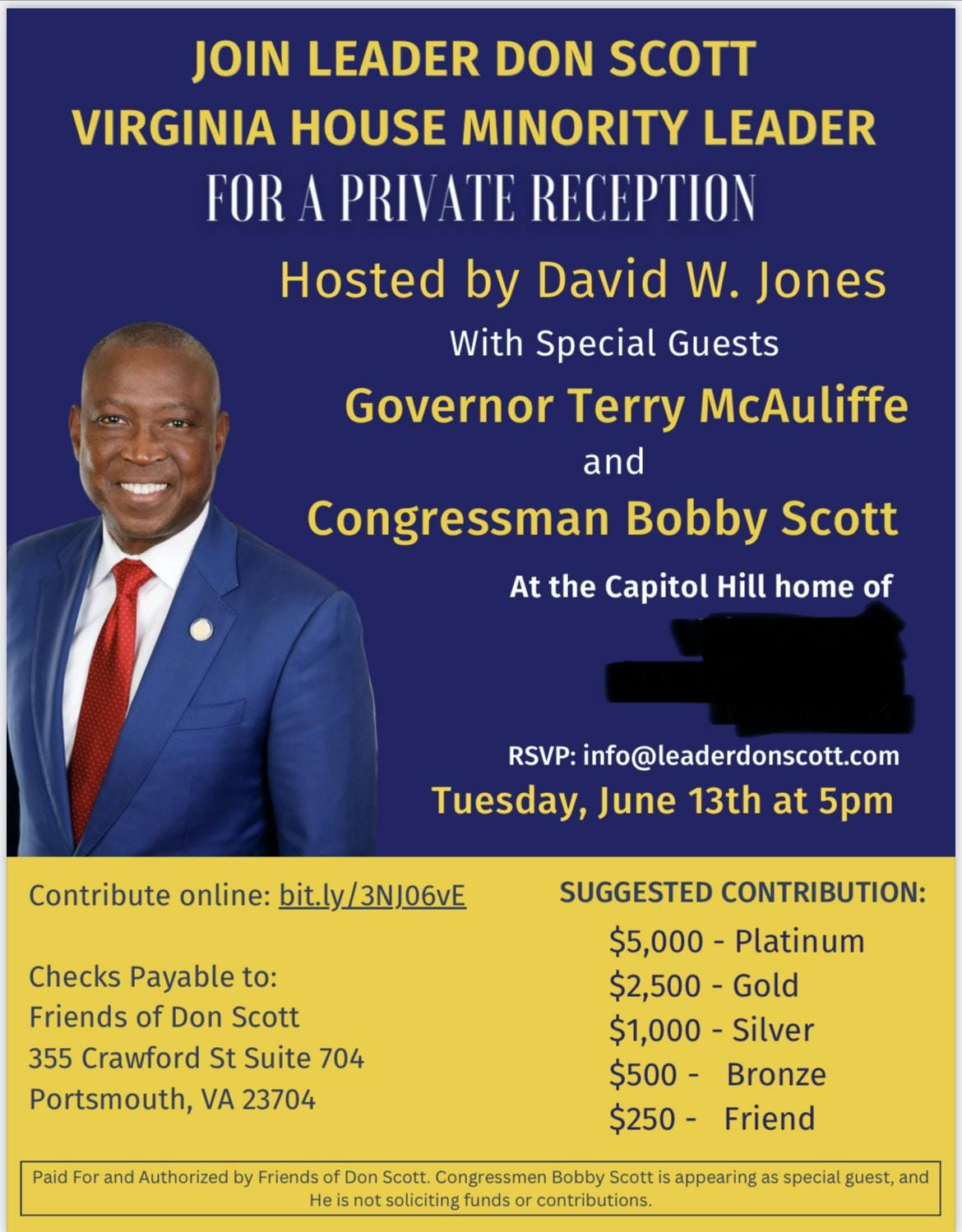
News and views
Local flavor
Wisconsin Rep. Mike Gallagher says he will not run for Senate in 2024, leaving an open GOP field, by Lawrence Andrea in The Milwaukee Journal-Sentinel
Anti-Boebert campaign PAC accuses Colorado congresswoman of defamation, by Nick Coltrain in The Denver Post
Georgia GOP elects election deniers to key posts, by Greg Bluestein and Mark Niesse in The Atlanta Journal-Constitution
Why what happened in 2021 Arizona election ‘audit’ still matters, by Robert Anglen in The Arizona Republic
Feds Got Permission To Trace Ald. Jim Gardiner’s Phone Calls As Part Of FBI Investigation, Court Records Show, by Ariel Parella-Aureli in Block Club Chicago
Scott Wiener is quietly amassing female leaders’ support in his campaign-in-waiting for Nancy Pelosi’s seat, by Joe Garofoli in The San Francisco Chronicle
Haley Stevens endorses Elissa Slotkin for U.S. Senate, by Riley Beggin in The Detroit News
‘Food for everyone.’ Trump detours to Versailles to court Hispanic voters after arraignment, by Michelle Marchante, Ana Ceballos, Linda Robertson, and Jimena Tavel in The Miami Herald
Long reads
Sarah Huckabee Sanders is content in Little Rock. For now. by Grace Segers in The New Republic: “[Sanders’s] prominent knack for partisan warfare, and early legislative successes, have cemented her as the Republican governor to watch in the not-quite-post-Trump era.”
This California Democrat might be the future of the party, by Jonathan Martin in Politico Magazine: “As his party attempts to reclaim the majority next year, [Aguilar is] embracing a new role: mentor, guide and, he hopes, eventually leader for the next generation of California Democrats emerging and arriving in Washington.”
Can Elise Stefanik become MAGA’s messenger in chief? by Abigail Tracy in Vanity Fair: “Once a Paul Ryan protégé, New York Republican Elise Stefanik has morphed into one of Donald Trump’s biggest cheerleaders. She’s now being charged with keeping the House GOP on message for a critical election cycle—and as Trump indictments mount.”
Colin Allred wants to be Beto O’Rourke—without the losing, by Sam Brodey in The Daily Beast: “Allred has a needle to thread with his candidacy. He needs to capture the excitement that O’Rourke generated, while not generating the GOP backlash. He wants to build a movement, while not raising the alarm for Republicans so they rally to Cruz’s side.”
The next Georgia? Biden campaign targets North Carolina to reshape 2024 electoral map, by Joey Garrison in USA Today: “Biden’s reelection campaign is targeting North Carolina as a top state to try to flip in 2024, with Democrats convinced that the Tar Heel state’s booming suburbs with college-educated voters around Charlotte and Raleigh’s Research Triangle, combined with its sizable Black population, make it prime for a Democratic pickup.”
No Labels, Mo’ Problems
This week saw several articles interrogating the motivations of No Labels, the controversial organization floating a third-party presidential bid. Here’s a roundup of some of our favorites:
No Labels’ latest recruit: The North Carolina ex-governor behind the infamous “Bathroom Bill,” by Daniel Strauss in The New Republic: “Pat McCrory oversaw the most contentious, divisive four years in the Tarheel State’s modern history. This is transpartisanship?”
No Labels likely to back off third party bid if DeSantis emerges as GOP nominee, by Shia Kapos in Politico: “That No Labels is hinging its third-party effort in part on Trump’s fate underscores that the group’s calculus is not tied tightly to ideological considerations.”
Democrats meet with anti-Trump conservatives to fight No Labels 2024 bid, by Michael Scherer in The Washington Post: “Their mission: to figure out how to best subvert a potential third-party presidential bid by the group No Labels, an effort they all agreed risked undermining Biden’s reelection campaign and reelecting former president Donald Trump to the White House.”
No Labels is helping a firm that raises money for right-wing extremists, by David Corn in Mother Jones: “The self-proclaimed centrist group is using a vendor that assists election deniers, MAGA Republicans, and the radical Trump right.”
Got a long read you’d like to share? Email us, and we’d be happy to include it in next week’s newsletter.
Cammie and Sammie
This week, we’re featuring Cammie and Sammie, submitted by Lauren Zelt of Zelt Communications. Cammie, a tan American foxhound, was adopted from Rural Dog Rescue in 2018. Lauren describes her as “the sassiest hound around,” who loves long walks and Ray LaMontagne (don’t we all?). Sammie, a black beagle, was adopted from Lucky Dog Animal Rescue in 2019 and currently reigns as the king of snuggles and carrier of his three favorite toys—Lamby, Pony, and Mr. Shark, in that order.

